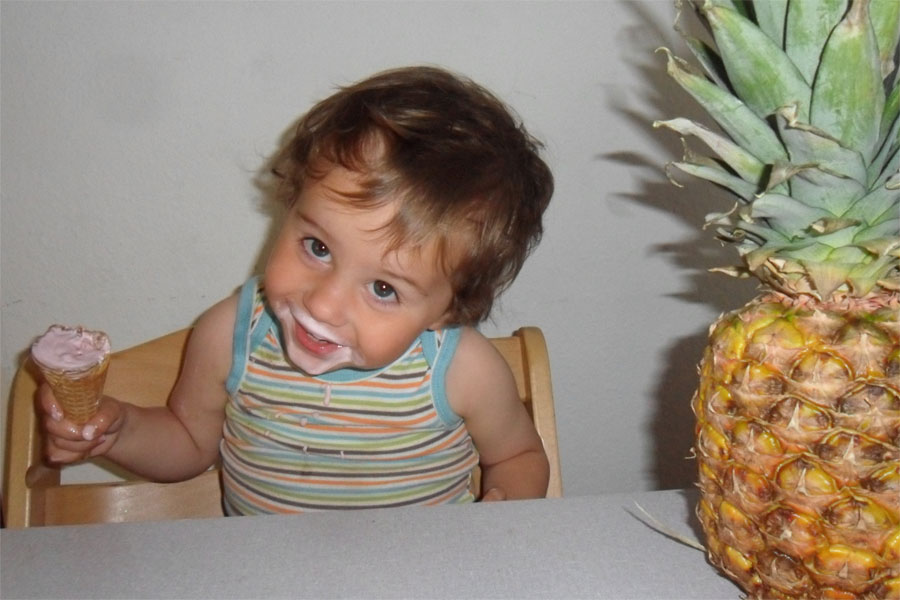From Policing to Parenting: Re-Humanization

Switching from the authoritarian standard to the un-raising way (un-raising –what? Click here for more…) often leaves parents with a chaotic existence - the kid is naked, laughing and shaking its head at you when you offer it clothes (any clothes - take the shorts even though it’s raining, wear the jumper with the hood at the front, I really don’t care, you want PJs? No, my dress…ok…no?!). It has drawn all over its arms, legs and torso with a ballpoint pen, its face bears witness to the last 3 meals (which it ate sitting on top of the table) and it keeps on saying “no!”, although the word has no relevance whatsoever to the things you are saying.
Yes this is a picture many of us know all too well. I’ve even heard of kids declining any form of nourishment (yes isn’t it crazy what child-rearing strategies do to make children defiant, rebellious and skeptical of us on many levels), only to waltz over to the fridge and eat chunks of cheese, take a bite of a nectarine and squish it between the hands before throwing it aside and directing its attention to the next victim - a banana, which is brutally mistreated and, likewise, tossed aside. Yes, changing paradigms is tricky for all involved.
The de-raising-phase calls for nerves of steel and utter patience until new habits and behaviors set in. Many retreat from their endeavor to free their kids, shouting and calling for order and obedience. They say it doesn’t work, this way of parenting - their kids need consequences (punishments).
Un-raising means not forming, coercing and manipulating your children, but seeing them for the people they are and respecting and trusting those people, greeting them with absolute authenticity and allowing everyone in your family to live autonomously and peacefully, living in partnership.
Kids who haven’t learnt to trust their sense and reason by developing their self-regulatory skills, but have been made compliant and obedient need time to grow into their new-found freedom.
They must first trust that it’s real, thus testing the boundaries of your new practice - because all they know is that there must be a forced boundary somewhere, as there always has been. And they never learnt to acknowledge real personal boundaries, theirs or yours; there was always something artificial that impeded this natural learning and the development of this part of their identity. For more on boundaries click here.
In the past you put patterns in place, and the children expect them to play out: They do something, you get upset, they carry on, you get angry and give ‘consequences’ or somehow pressurize them to stop.
The kids are now allowed to do as they please, wear what they wish, eat what they want and so on; you are respecting their rights as independent individuals. It’ll take time until they wish to use your advice, they hadn’t the choice before – and having the choice makes all the difference.
We realize it’s not up to us to decide everything that goes on – the child’s opinion and need are equal to ours. Yes equal. The responsibility that goes along with parenting children is ours to carry until the children take on their part of it when they are ready, but choices are made together, without one speaking a word of power over the other.
We must be patient and co-regulate, showing them they can make decisions, but mustn’t by themselves. We must prove to them that we take them seriously, for that is what they want to trust. We must accompany them and tend to our relationships that suffered in the past.
When we don’t need to bark orders, check up on things, make sure that rules are upheld and punishments followed through, the tone of our voice changes and we become parents again, as appose to the policemen we were before.
We can speak to our children and listen to what they have to say. The stress of the implications subsides (what will people think? What will my child learn? What will the consequences of this be for me? Think up some good consequence to punish my child’s actions - quick!), as does the constant strain of having to be the bad cop. Things can happen. Clothes can get wet or dirty and be cleaned up after play, appointments can be postponed, and the odd midnight feast may be in order. The world doesn’t end and our child won’t become spoilt when he gets what he wants. He learns to make decisions and interact with humans. He learns the actual consequences of his actions at a time where they stay in the realm of “oh you’ve drawn on the wall” rather than “oh my god you borrowed the neighbor’s car and drove it without having a license and crashed it?!”
When we aren’t holding things above their heads and threatening them, forcing them to act a certain way, our children are able to trust us again and feel seen and respected as human beings, as they experience our authentic connection. They also have this way of living to model, so rather than seeking out power-struggles in order to experience their own authority and impact on the world, they realize authentic connection stills this need they have, and they needn’t fight any more.
We live our lives in partnerships instead of opposition and this is what it’s all about: this attitude allows us to be human again. The question is never “does this work” but rather “how can I support you”. We aren’t issuing a new concept; we are acknowledging individuals, respecting them and addressing unique situations as they come along.
We can stand the weeks of chaos; we know why we’re doing it. Just smile and have fun - you can make the best of any situation.
I invite you to take your liberty and join the revolution!



